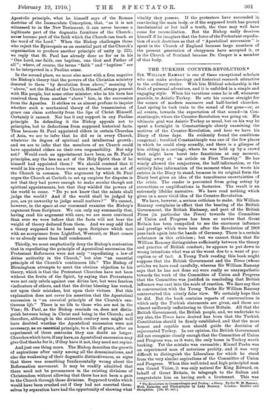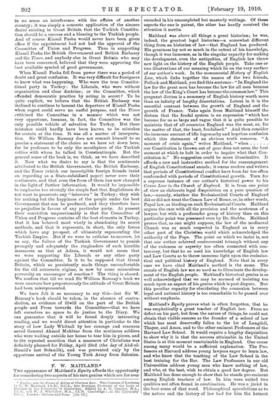THE TURKISH COUNTER-REVOLUTION.* SIR WILLIAM RAMSAY is one of those
exceptional scholars who can make archaeology and historical research attractive to the ordinary reader. With him Biblical scholarship is the fruit of personal adventure, and it is unfolded in a simple and engaging style. When his vacations come he is off, whenever possible, to Asiatic Turkey. He sets his course straight for the scenes of modern massacre and half-buried churches. Last spring he took train to the sound of the guns—or, at all events, towards the expectation of that sound—in Con- stantinople, where the Counter-Revolution was going on. His ultimate goal was Asiatic Turkey as usual, but on his way he spent a fortnight in Constantinople closely examining the motives of the Counter-Revolution, and here we have his Diary of those days. He evidently found the conditions congenial ; troubled Constantinople was one of the few places in which be could sleep soundly, and there is a glimpse of him sitting in a carriage, where he was held up by a crowd that might have burst into fanaticism at any moment, writing away at " an article on First Timothy." He has wisely allowed the conjectures, the half-information, or the entirely false information of the moment when he wrote his entries in the Diary to stand, because in its original form the Diary best gives an idea of the tumultuous uncertainties of the crisis. The reader is prevented from going astray by corrections or amplifications in footnotes. The result is an extremely lifelike narrative. We have read nothing which gives us a more vivid idea of the Counter-Revolution.
We have, however, a serious criticism to make. Sir William Ramsay complains in effect that the bearing of the British Government, the British Embassy, and part of the British Press (in particular the Times) towards the Committee of Union and Progress has been so unwise that Great Britain has been compelled to see the enormous influence and prestige which were hers after the Revolution of 1908 pass back again into the bands of Germany. There is a certain substance in this criticism ; but we cannot think that Sir William Ramsay distinguishes sufficiently between the theory and practice of British conduct; he appears to put down to wrong intentions what was at the worst due to a want of per- ception or of tact. A Young Turk reading this book might suppose that the British Government and the Times (whose articles we have read carefully, whereas Sir William Ramsay says that he has not done so) were really so unsympathetic towards the work of the Committee of Union and Progress that the Committee was justified in concluding that British influence was cast into the scale of reaction. We dare say that in conversation with the Young Turks Sir William Ramsay controverted this utterly false view. We certainly hope that he did. But the book contains reports of conversations in which only the Turkish statements are given, and these are almost uniformly unflattering to Great Britain. All that the British Government, the British people, and, we undertake to say also, the Times have desired has been that the Turkish Constitution should be firmly established, and that the most honest and capable men should guide the destinies of rejuvenated Turkey. In our opinion, the British Government did not recognise clearly enough that the Committee of Union and Progress was, as it were, the only horse in Turkey worth backing. Yet the mistake was excusable ; Kiamil Pasha was an experienced man of notorious probity, and it was very difficult to distinguish the Liberalism for which he stood
from the very similar aspirations of the Committee of Union and Progress. When this well-tried and high-principled man was Grand Vizier, it was only natural for King Edward, on behalf of Great Britain, to telegraph to the Sultan and congratulate him on having such a lieutenant. This was
* The Revolution in Constantinople and Turk : a Diary. By Sir W. M. Ramsay. With Episodes and Photographs by Lady Ramsay. London : Hodder and. Stoughton. [1O% 6d. net]
in no sense an interference with the affairs of another Country ; it was simply a concrete application of the sincere desire existing in Great Britain that the Turkish Constitu- tion should be a success and a blessing to the Turkish people. And of course Kiamil Pasha would never have been given office if the appointment had not had the approval of the Committee of Union and Progress. Thus in supporting Kiamill'asha the British Government and British Embassy and the Times, and anybody else in Great Britain who may have been concerned, believed that they were approving the best available symbol of good government.
When Mandl Pasha, fell from power there was a period of doubt and great confusion. It was very difficult for foreigners to know what was happening. Who were the true Constitu- tional party in Turkey : the Liberals, who were without organisation and clear doctrine ; or the Committee, which offended democratic practice by acting in secret P To be quite explicit, we believe that the British Embassy was inclined to continue to lament the departure of Kiamil Pasha when regret could serve no useful purpose, and the Times criticised the Committee in a manner which was not very opportune, because, in fact, the Committee was the only possible vehicle of salvation for Turkey. But these Mistakes could hardly have been known to be mistakes for certain at the time. It was all a matter of interpreta- tion. Sir William Ramsay does not commit himself to so precise a statement of the choice as we have set down here, for he professes to be only the mouthpiece of the Turkish critics with whom he talked in Constantinople. But the general sense of the book is, we think, as we have described it. Now what we desire to say is that the sentiments attributed to the British Government, the British Embassy, and the Times (which our incorrigible foreign friends insist on regarding as a State-subsidised paper) never were their sentiments, and that even the form of them has now changed in the light of further information. It would be impossible to emphasise too strongly the simple fact that Englishmen do not want to prosecute any " interests " in Turkey ; they wish for nothing but the happiness of the people under the best Government that can be produced, and they therefore have no prejudice in favour of any particular party. At present their conviction unquestionably is that the Committee of Union and Progress contains all the best elements in Turkey, that it has behaved most wisely in abandoning its secret methods, and that it represents, in short, the only forces which have any prospect of ultimately regenerating the Turkish Empire. But if we were to criticise to-morrow, let us say, the failure of the Turkish Government to punish promptly and adequately the ringleaders of such horrible Massacres as that at Adana, it would not mean that we were supporting the Liberals or any other party against the Committee. Is it to be supposed that Great Britain, which so persistently made things uncomfortable for the old autocratic regime, is now by some miraculous perversity an encourager of reaction P The thing is absurd. We confess that till we read Sir William Ramsay's book we were unaware how preposterously the attitude of Great Britain had been misrepresented.
We have felt it so necessary to say this—lest Sir W. Ramsay's book should be taken, in the absence of contra- diction, as evidence of illwill on the part of the British people and Press towards the Committee—that we have left ourselves no space to do justice to the Diary. We can guarantee that it will be found deeply interesting reading, and we would direct attention in particular to the story of how Lady Whitten by her courage and resource saved General Ahmed Mukhtar from the mutinous soldiers who were waiting outside her house to tear him in pieces, and to the repeated assertion that a massacre of Christians was definitely planned for Friday, April 2,:ird (the day of Abd-ul- Hamid's last Selamlik). and was prevented only by the opportune arrival of the Young Turk Army from Salonica.









































 Previous page
Previous page